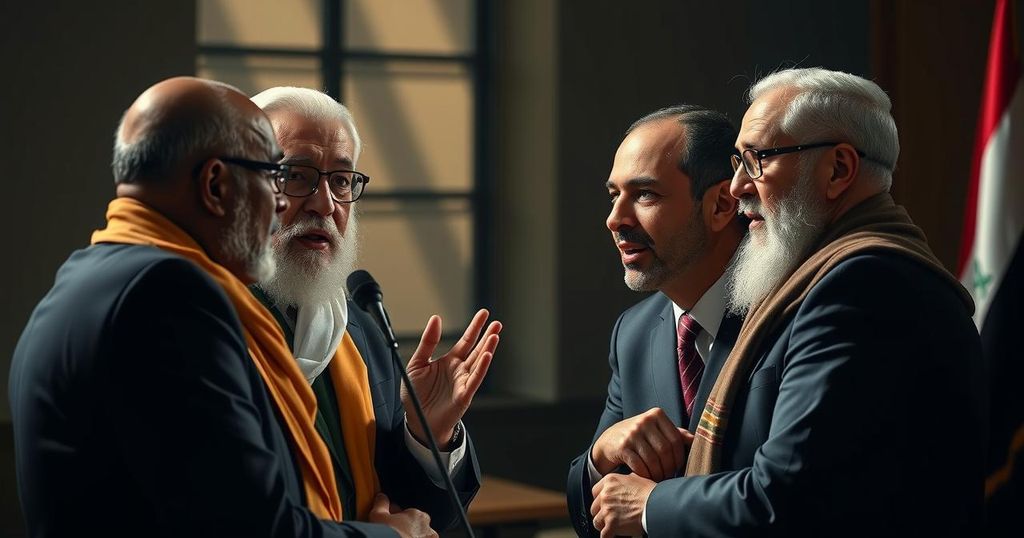Biden Highlights Opportunities for Conflict Resolution Between Iran and Israel
U.S. President Joe Biden has expressed cautious optimism about reducing conflict between Iran and Israel, suggesting potential opportunities for a ceasefire in Lebanon. However, he conveyed skepticism regarding the immediate prospects for a ceasefire in Gaza, amidst ongoing violence and humanitarian crises. Biden reiterated U.S. military support for Israel and acknowledged the complexities of the geopolitical situation.
On Friday, United States President Joe Biden expressed a cautiously optimistic outlook regarding the potential to mitigate ongoing hostilities between Iran and Israel. While addressing reporters in Berlin alongside leaders from Germany, France, and the United Kingdom, he emphasized the possibility of fostering a ceasefire in Lebanon, although he conveyed skepticism about achieving a resolution in the Gaza conflict in the near future. Biden remarked, “There’s an opportunity in my view – and my colleagues agree – that we can probably deal with Israel and Iran in a way that ends the conflict for a while. In other words, it stops the back and forth.” Biden’s comments suggest a potential shift in the U.S. government’s stance, particularly in light of the recent assertive military actions by Iran and Israel. The United States State Department recently indicated it is no longer pursuing a ceasefire between Hezbollah and Israel, asserting that Hezbollah is in a weakened position following significant leadership losses. In reaction to prior Israeli airstrikes, Iran launched missile strikes targeting Israeli military sites. Notably, Biden affirmed he understood the timing and nature of Israel’s military responses; however, he declined to disclose further details. Historically, the United States has voiced its opposition to Israeli strikes on Iranian nuclear or oil facilities, mindful of the consequences that could arise from a spike in global oil prices. As for the ongoing crisis in Gaza, Biden acknowledges the challenges, particularly following the recent death of Hamas leader Yahya Sinwar, describing this as an “opportunity” for potential resolution. He reiterated the United States’ commitment to military support for Israel despite the current humanitarian crisis unfolding in Gaza. The latest hostilities have inflicted significant civilian casualties, with reports indicating over 42,500 Palestinian deaths and widespread destruction in Gaza. While the U.S. continues to back Israel’s military operations in Lebanon, Hezbollah has escalated its confrontations, resulting in considerable casualties to Israeli forces.
The recent escalation of conflict involving Iran, Israel, and Gaza has raised international concerns over stability in the Middle East. President Biden’s comments reflect an evolving U.S. diplomatic strategy in the face of complex geopolitical dynamics, including the rising tensions following the assassination of key Iranian and Hezbollah figures. The historical context of U.S. involvement in Middle Eastern affairs includes longstanding military support for Israel and a recent public acknowledgment of the complexities posed by Iranian aggression. The situation has been complicated by humanitarian crises in Gaza, sparking debates about U.S. foreign policy and its implications for regional stability.
In summary, President Biden’s remarks present a nuanced perspective on the possibility of curbing hostilities between Iran and Israel while highlighting the ongoing challenges in Gaza. The U.S. administration appears to be navigating a delicate diplomatic landscape, balancing military support for Israel with escalating humanitarian crises. The need for a sustainable resolution in the region remains urgent, as military actions from both sides continue to result in heavy civilian tolls. Biden’s comments also indicate a cautious openness to ceasefire negotiations in Lebanon, suggesting a potential avenue for diplomatic engagement.
Original Source: www.aljazeera.com




Post Comment